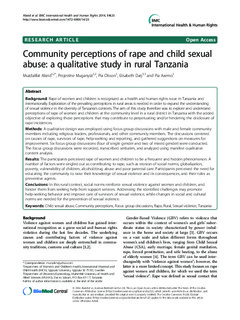| dc.contributor.author | Abeid, Muzidalifat | |
| dc.contributor.author | Muganyizi, Projestine | |
| dc.contributor.author | Olsson, Pia | |
| dc.contributor.author | Darj, Elisabeth | |
| dc.contributor.author | Axemo, Pia | |
| dc.date.accessioned | 2019-11-06T07:27:56Z | |
| dc.date.available | 2019-11-06T07:27:56Z | |
| dc.date.created | 2014-08-22T10:01:35Z | |
| dc.date.issued | 2014 | |
| dc.identifier.citation | BMC International Health and Human Rights. 2014, 14 (23), . | nb_NO |
| dc.identifier.issn | 1472-698X | |
| dc.identifier.uri | http://hdl.handle.net/11250/2626767 | |
| dc.description.abstract | Background
Rape of women and children is recognized as a health and human rights issue in Tanzania and internationally. Exploration of the prevailing perceptions in rural areas is needed in order to expand the understanding of sexual violence in the diversity of Tanzania’s contexts. The aim of this study therefore was to explore and understand perceptions of rape of women and children at the community level in a rural district in Tanzania with the added objective of exploring those perceptions that may contribute to perpetuating and/or hindering the disclosure of rape incidences.
Methods
A qualitative design was employed using focus group discussions with male and female community members including religious leaders, professionals, and other community members. The discussions centered on causes of rape, survivors of rape, help-seeking and reporting, and gathered suggestions on measures for improvement. Six focus group discussions (four of single gender and two of mixed gender) were conducted. The focus group discussions were recorded, transcribed verbatim, and analyzed using manifest qualitative content analysis.
Results
The participants perceived rape of women and children to be a frequent and hidden phenomenon. A number of factors were singled out as contributing to rape, such as erosion of social norms, globalization, poverty, vulnerability of children, alcohol/drug abuse and poor parental care. Participants perceived the need for educating the community to raise their knowledge of sexual violence and its consequences, and their roles as preventive agents.
Conclusions
In this rural context, social norms reinforce sexual violence against women and children, and hinder them from seeking help from support services. Addressing the identified challenges may promote help-seeking behavior and improve care of survivors of sexual violence, while changes in social and cultural norms are needed for the prevention of sexual violence. | nb_NO |
| dc.language.iso | eng | nb_NO |
| dc.publisher | BioMed Central | nb_NO |
| dc.relation.uri | http://onlinelibrary.wiley.com/doi/10.1111/scs.12166/full | |
| dc.rights | Navngivelse 4.0 Internasjonal | * |
| dc.rights.uri | http://creativecommons.org/licenses/by/4.0/deed.no | * |
| dc.title | Community perceptions of rape and child sexual abuse: a qualitative study in rural Tanzania | nb_NO |
| dc.type | Journal article | nb_NO |
| dc.type | Peer reviewed | nb_NO |
| dc.description.version | publishedVersion | nb_NO |
| dc.source.volume | 14 | nb_NO |
| dc.source.journal | BMC International Health and Human Rights | nb_NO |
| dc.source.issue | 23 | nb_NO |
| dc.identifier.doi | 10.1186/1472-698X-14-23 | |
| dc.identifier.cristin | 1148662 | |
| dc.description.localcode | This article is published under license to BioMed Central Ltd. This is an Open Access article distributed under the terms of the Creative Commons Attribution License (http://creativecommons.org/licenses/by/2.0), which permits unrestricted use, distribution, and reproduction in any medium, provided the original work is properly credited. The Creative Commons Public Domain Dedication waiver (http://creativecommons.org/publicdomain/zero/1.0/) applies to the data made available in this article, unless otherwise stated. | nb_NO |
| cristin.unitcode | 194,65,20,0 | |
| cristin.unitname | Institutt for samfunnsmedisin og sykepleie | |
| cristin.ispublished | true | |
| cristin.fulltext | original | |
| cristin.qualitycode | 1 | |

